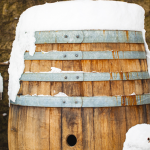Cold weather fermentation
Brrr… it’s starting to get cold outside! Especially here in New England.
In the Northeast we get the joy of experiencing four distinct seasons. Harvest time is filled with lots of excitement in the air during the warm days and cool nights… but when the warm days start to turn into cool days too, things can get a little more complicated if your wine isn’t done fermenting.
Sometimes wine season extends into winter…As anyone who makes wine knows, the alcoholic fermentation process can create some serious heat. As long as it doesn’t get too cold outside, the heat generated from this can pretty much sustain itself without issue.
But once the alcoholic fermentation slows down and eventually ends, if the malolactic fermentation (MLF) hasn’t finished and your wine is in a pretty cold (or even cool) location, it can be difficult to get MLF to finish. A half completed MLF can pose some issues in and of itself: delayed SO2 additions, persistent fizz, and stability issues down the road.
So what can you do to ensure you have as smooth a fermentation as possible that isn’t TOO quick, yet doesn’t drag on for too long?
- Choose earlier ripening varieties if you live in cold regions and/or the place you ferment your wine is in a cold place like a basement/cellar.
- Try co-inoculation as your method of malolactic fermentation.
- Use space heaters as needed. These can be placed in small spaces with your barrels to prevent MLF from slowing down or even stopping entirely.
- Choose a fast fermenting yeast strain.
What are the potential results of making wine in cold weather?
- Stuck alcoholic fermentation
- Stuck malolactic fermentation
- Unintentional cold stabilization (this can be positive or negative depending on the wine and style you’re attempting) as it can affect the TA even when you don’t want the TA to move, whether upwards or downwards.







Recent Comments